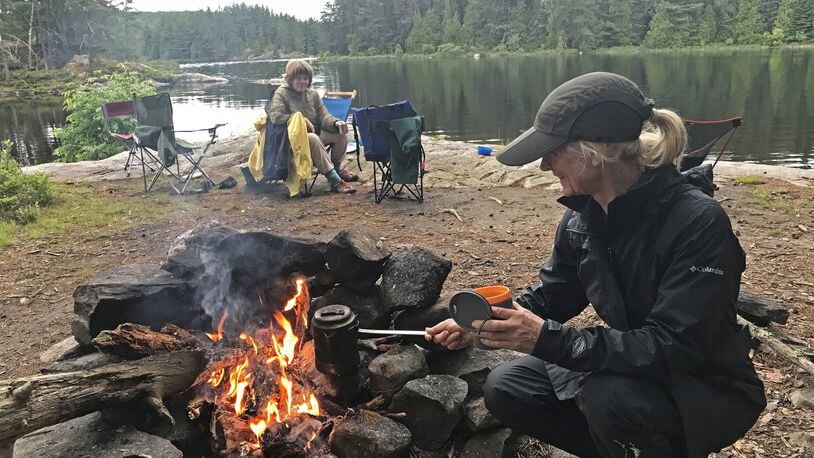For some of the women the expedition was a “bucket list” adventure — something they always wanted to do. For others the excursion was a welcome nudge that pushed them outside their comfort zones.
Most of the women met decades ago as Girl Scout moms. In more recent years they’ve gathered monthly as part of a book club, a group that sometimes travels up north for long weekends to kick back in warm cabins with comfortable beds.
On their paddling and camping excursion into Quetico Provincial Park, the Canadian wilderness lying adjacent to the BWCA, the women enjoyed no such comforts. They slept on the ground in tents.
Age of the group ranges from late 50s to early 60s, and the concern among some was that if they didn’t venture forth on an outing of this type now, they never would.
“I had high expectations thinking this could possibly be my last trip of this type to the area,” said Lynn Allar, 62, of Greenwood. “I expected this trip to be incredible. But it was way more than that. I now have several more ‘happy places’ I can retreat to as I sit at my office desk.”
The women could have hired a guide to organize their gear and do their cooking. But the six “alpha women” (Allar’s description) never entertained the chaperone idea.
“We figured things out as we went along,” said Mary Benson, 60, of Shorewood.
Female paddlers make up only about a quarter of overnight BWCA visitors, according to the U.S. Forest Service. The percentage has fluctuated little in 40 years.
“Social-cultural stereotypes” that portray wilderness experiences as “not appropriate for women due to their lack of strength, skill and experience” might be one reason relatively few women choose to “rough it,” research shows.
But changes might be afoot. Certainly women today — especially young women — are portrayed more often than in the past in advertising and media as equally capable and enthusiastic as men about outdoor activities. Companies such as Patagonia, North Face and Athleta, among many others, market not only outdoor clothing but outdoor lifestyles to women, validating to wide audiences their participation in activities ranging from running to surfing, camping to climbing.
How this will play out is unknown. The nation is fast becoming urbanized, which in many areas of the country has coincided with a falloff in participation in traditional outdoors activities such as hunting and fishing (Minnesota excepted).
Perhaps increased participation by women will slow these declines, or even reverse them. Or perhaps the ratio of women to men in the outdoors will tilt more favorably toward women, while overall participation declines nevertheless.
Credit: Jeff Wheeler
Credit: Jeff Wheeler
What the six women lacked in boundary waters experience, they made up for in planning.
For months before their June 16 departure, they met to discuss tents, sleeping bags, cook stoves and other gear. Maps were unfurled, the merits of various campsites discussed, and a menu was developed.
“Being prepared and having good weather made a big difference in the enjoyment of our trip,” said Donna Pickard, 56, of Excelsior. “We had no really cold or hot days, and the little rain that fell came straight down with no wind or lightning.”
The group rented canoes from Zup’s Fishing Resort and Canoe Outfitters on Lac la Croix, and also sought trip-route help from owners Mark and Kathy Zup.
Departing from Crane Lake, the group was transported by motorboat (“towboat”) to Sand Point Lake, where they cleared Canadian customs, then up the Loon River, over two mechanized portages, to Lac la Croix.
The next morning the women’s gear and three canoes were strapped onto another towboat and the group was transported about 20 miles up Lac la Croix to a portage leading to McAree Lake.
“I thought the portage would be flat and wide with a real trail,” said Kathryn Erickson, 57, of Excelsior. Instead it was muddy and buggy, with rain falling.
“My greatest challenge and feeling of accomplishment came from crossing that portage,” Benson said. “But we did it.”
Patrice Aubrecht, 59, of Shorewood, the camp chef, had used a website, paddleplanner.com, to assess various McAree Lake campsites.
“The internet search resulted in a five-star island paradise with a million-dollar southwest view,” Aubrecht said. “The stone fire pit and a nearby counter built of logs left by a previous visitor was the camp kitchen of my dreams.”
Some boundary waters visitors break camp every day, traveling and portaging. But the women set up a base camp on McAree, and took day trips from there. No one in the group was an experienced angler. But four women bought fishing licenses, hoping to provide a meal or two of walleye, lake trout or smallmouth bass.
“We managed to come up with two fish meals,” Allar said.
Said Benson: “Being outdoors in the elements — the view, the sounds and the solitude were refreshing to the soul.”
Jane Stark, 57, of Excelsior, agreed. “Gather wood, filter water, read a book, paddle around, keep the fire going, eat simply, dress simply and then take all the time you want to view the beautiful surroundings,” she said.
Added Erickson: “I liked waking up in the morning and listening to all the birds.”
On a disappointing note, the women’s exuberance upon successfully reaching their island home the first day and establishing their camp quickly led to a prolonged happy hour that evening that drew down the wine supply beyond the day’s ration.
“This resulted in restrictive wine allocations the last two evenings,” Aubrecht said. “Other than that, my wilderness experience was better than I could have imagined. It enriched my life.”
About the Author
